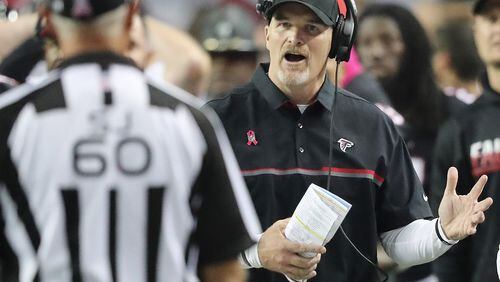Ensuring nobody will declare, "I'm certain the Falcons will make the playoffs," for at least several weeks and possibly the remainder of the season, the team that keeps Atlanta sports fans on the edge of their seats -- or a cliff -- did it again Sunday. They led 27-10 but lost 33-30 in overtime to the San Diego Chargers, a team they were expected to beat.
For my column on the game, click here.
Most of the conversation early this week will focus on coach Dan Quinn's decision to go for it on fourth-and-1 from the Falcons' 45 in overtime. That's understandable. I'm just not so sure it was the wrong decision.
Running back Devonta Freeman was tackled by Chargers linebacker Denzel Perryman for a two-yard loss on a slow-developing running play. That effectively was the game, because San Diego took over at the Falcons' 43, drove with way too much ease to the 24 and kicked a 42-yard field goal to win the game.
Quinn's decision could be debated either way. If he decides to punt from near midfield, there's a chance the Falcons can pin San Diego deep in its own territory. But the Chargers had been driving the ball on the Falcons' defense all game, totaling 426 yards in offense (348 passing). So why give the opponent with momentum that chance? Going for it represents a significant risk but a team should be able to gain a yard and Quinn has vowed to be an aggressive coach.
Quinn said after the game that the Falcon defense's faltering performance "was not a factor" in his decision. Rather, it was about what he wants the "team's mindset" to be.
OK, but the play call was not great. It seemed more logical if the Falcons called a running play with Freeman straight up the gut behind a lead blocker. Or even have Ryan fake a handoff and then roll out, where he can either run it himself or complete a quick toss to Julio Jones.
But the biggest issue wasn't the fourth down, it was everything that led up to it. A home team with a 27-10 lead over an underdog opponent should be able to slam the door on a win. Or as the Falcons like to say: finish.
Here are three things that lost the game for the Falcons before the fourth-down play:
- DEFENSE: San Diego quarterback Phillip Rivers torched the Falcons with passes underneath the coverage for most of the game. That included three third-down completions on a fourth-quarter touchdown drive. The Chargers converted five of seven third downs in the fourth quarter, as well as a fourth-and-2. It was a bad day for a young defensive unit that had started to make progress and made some big plays Sunday, including forcing two turnovers that led to 10 points and sacked Rivers four times. But they got beat on too many passes.
- RYAN'S INTERCEPTION: Even with San Diego's comeback, the Falcons led 30-27 and had a chance to expand their lead and potentially put this game away with less than four minutes remaining. But on first down from the 50, Ryan tried to force a pass to Julio Jones at the Chargers' 35. Jones was double-covered and Perryman picked off Ryan's underthrow. If the Falcons can come away with just field goal on that possession, it forces San Diego to try to score a touchdown on its next possession. Ryan: "Their linebacker peeled off the inside rout and went outside, and I saw it too late. That's something I've got to be better at. I think I could probably let that ball go a little bit earlier with a little better anticipation. If not, then check the ball down." Actually, probably just check down or throw it away.
- PENALTIES: The Falcons had nine penalties for 70 yards (the Chargers: only three for 14). Preceding Ryan's interception, the Falcons had consecutive false start penalties after having a first down at the San Diego 40. They had four false starts in the game. At home. That's inexcusable. So was the third-quarter play on punt coverage by Therezie Robenson to plow into Chargers returner Dexter McCluster before McCluster had a chance to catch the ball. The resulting penalty meant San Diego could start its possession at the 31 instead of the 17, and it drove to a field goal on that drive, narrowing the score to 27-20.
All of the aforementioned came before Quinn's fourth-down decision. That's why the Falcons are 4-3.
Subscribe to the new, “We Never Played The Game” podcast with Jeff Schultz and WSB's Zach Klein. All episodes can be downloaded and heard on iTunes or here via WSBRadio.com. New episodes every Monday and Thursday.
- Throwback performance: Falcons blow 27-10 lead and lose
- If Howard can help Hawks, he'll change how his story is written
- Weekend Predictions: Dogs, Jackets hibernate; Falcons, Bama roll
- Paul Johnson on critics, future; will Jackets finish better than Dogs?
- Georgia's makeover looks more like a decline
- Georgia playing to level of opponents -- and against Vandy, that's bad
- Weekend Predictions: Votes for Dogs and Jackets, but Falcons' run ends in Seattle
- Podcast blog: Braves should have done a little more for Snitker
- Brian Snitker, a 40-year temp, finally gets his shot
- Braves' Snitker an unusual choice but not necessarily wrong choice
- Podcast blog: Arthur Blank (Part II): On future, Vick and his plans to fire Petrino anyway
- After past two weeks, any win looks good to Georgia
- Jacob Eason struggles in win but it's a little early to jump ship
- Braves wrong to blame McDowell for struggling prospects
- Weekend Predictions: Georgia wins over remains of Spurrier's mess
- NEW: Podcast b log: 'We Never Played The Game' podcast (Arthur Blank, Part I)
- Positive vibes about rebuild aside, Braves still need starting pitching
- Snitker was good but Bud Black may be Braves' choice for manager
- View in NFC South isn't what most expected: Falcons on top
- It's early but Falcons are looking legit
- Will optics of Mark Richt (4-0) vs. Kirby Smart (3-2) get better for Georgia?
- Mark Richt makes his return and looks right at home again at Georgia Tech
- Best Braves memory at Turner Field: 2010 and Bobby Cox's final season
- Weekend Predictions: And now for something completely different -- Dogs win
- Falcons' Deion Jones runs for glory, not survival, in return home
- Falcons create a new memory for themselves in New Orleans
- Falcons can't create more happy memories for Saints
- LSU just fired Les Miles -- this is what lunacy looks like
About the Author






